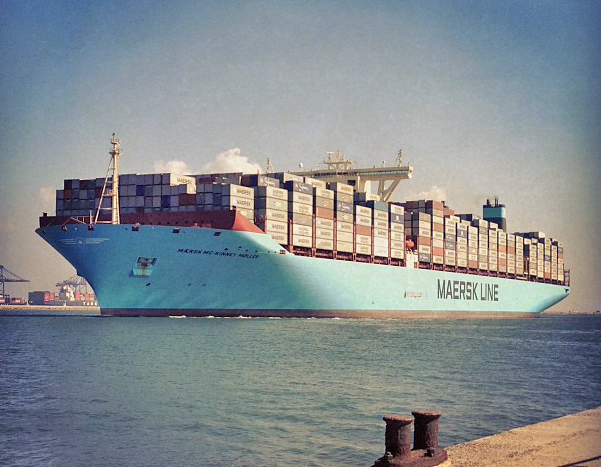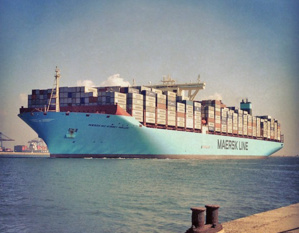Maersk Line Company, part of the conglomerate AP Moller-Maersk Group, announced massive cuts in personnel. The company's management said that the "difficult decisions" had been taken because of the need to adapt to the current challenging market conditions.
- In response, both the short- and long-term market challenges, Maersk Line increases the number of measures already taken to reduce costs. Maersk Line will reduce volume of container traffic and postpone investment in traffic increase. At the same time, operating costs will be reduced through implementation of plans to simplify the organization structure. Today, global staff of Maersk Line consist of 23 thousand people. Organizational changes, and ongoing processes of automation and introduction of digital technologies will allow Maersk Line to reduce global headcount by at least 4 thousand by the end of 2017.
Maersk Line announced plans to reduce the cost of sales, general and administration expenses (Sales, general & administration, SG & A) for $ 250 million - $ 150 million in 2016 and $ 100 million - in 2017
Maersk Line’s announced plans show plainly that the largest company in the world for sea container traffic is quite skeptical about the prospects for the world economy and world trade in the coming years.
Previously, Moller-Maersk said in an interview with CNBC that the company is ready to survive this period and keep its 15% share the world market of container transportation.
- We do not want other companies to overtake us and invest more aggressively, so we will defend our leading position in the market, that is, we will achieve growth to be slightly ahead of the market," - said Niels Andersen in the CNBC interview.
Andersen admits that the freight industry has currently found itself in a very difficult situation.
Not so long ago, overcapacity was formed in the area of cargo transportation. This came immediately after boom of orders for shipping, which coincided with the economic crisis. It resulted with decline in freight rates.
According to the financial statements for the II quarter of this year, published in August, Maersk Line net profit has decreased by 7.3% ($ 507 million) compared to the same period last year ($ 547 million) due to the fall in freight rates in the region trade between Europe and Asia.
Maersk is considered to be a kind of world trade indicator, as it accounts for 15% of global container transport industry. Andersen explains the challenges faced by the industry:
- I believe that the most important factor at the moment is the situation of capacity excess, which is particularly noticeable in the Asian and European regions, which are the most important direction of trade. So in this business, we have been under pressure for a very long time, many years. So, there is nothing new, and we believe that our industry must learn to survive in the face of capacity excess,"- he said.
Andersen believes that the problem of overcapacity is aggravated by delivery of new vessels, which account for 9% of the total world fleet. "The volume of trade is growing at 2%, so that all capacity excess is growing," - he said.
Prior to the economic crisis led to a decline in demand for products, the company's maritime container traffic recorded an increase in demand of more than 10% per year.
Andersen said that one cannot expect return to growth in demand at the moment.
- We changed the forecast demand for container shipments to decrease by 3-5%. I believe that in the short term, it will be about 2% this year and 2%-4% next year. Therefore, it is necessary to look more realistic on the situation.
source: wsj.com
- In response, both the short- and long-term market challenges, Maersk Line increases the number of measures already taken to reduce costs. Maersk Line will reduce volume of container traffic and postpone investment in traffic increase. At the same time, operating costs will be reduced through implementation of plans to simplify the organization structure. Today, global staff of Maersk Line consist of 23 thousand people. Organizational changes, and ongoing processes of automation and introduction of digital technologies will allow Maersk Line to reduce global headcount by at least 4 thousand by the end of 2017.
Maersk Line announced plans to reduce the cost of sales, general and administration expenses (Sales, general & administration, SG & A) for $ 250 million - $ 150 million in 2016 and $ 100 million - in 2017
Maersk Line’s announced plans show plainly that the largest company in the world for sea container traffic is quite skeptical about the prospects for the world economy and world trade in the coming years.
Previously, Moller-Maersk said in an interview with CNBC that the company is ready to survive this period and keep its 15% share the world market of container transportation.
- We do not want other companies to overtake us and invest more aggressively, so we will defend our leading position in the market, that is, we will achieve growth to be slightly ahead of the market," - said Niels Andersen in the CNBC interview.
Andersen admits that the freight industry has currently found itself in a very difficult situation.
Not so long ago, overcapacity was formed in the area of cargo transportation. This came immediately after boom of orders for shipping, which coincided with the economic crisis. It resulted with decline in freight rates.
According to the financial statements for the II quarter of this year, published in August, Maersk Line net profit has decreased by 7.3% ($ 507 million) compared to the same period last year ($ 547 million) due to the fall in freight rates in the region trade between Europe and Asia.
Maersk is considered to be a kind of world trade indicator, as it accounts for 15% of global container transport industry. Andersen explains the challenges faced by the industry:
- I believe that the most important factor at the moment is the situation of capacity excess, which is particularly noticeable in the Asian and European regions, which are the most important direction of trade. So in this business, we have been under pressure for a very long time, many years. So, there is nothing new, and we believe that our industry must learn to survive in the face of capacity excess,"- he said.
Andersen believes that the problem of overcapacity is aggravated by delivery of new vessels, which account for 9% of the total world fleet. "The volume of trade is growing at 2%, so that all capacity excess is growing," - he said.
Prior to the economic crisis led to a decline in demand for products, the company's maritime container traffic recorded an increase in demand of more than 10% per year.
Andersen said that one cannot expect return to growth in demand at the moment.
- We changed the forecast demand for container shipments to decrease by 3-5%. I believe that in the short term, it will be about 2% this year and 2%-4% next year. Therefore, it is necessary to look more realistic on the situation.
source: wsj.com






